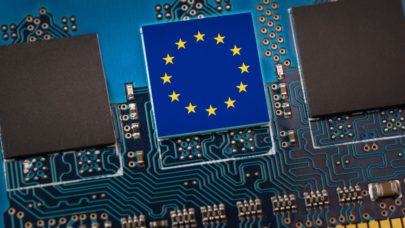
Next Euro HPC Chip Coming Next Year Will Be in 2026 EU Exascale System
March 7, 2024
The next supercomputing chip for Europe's homegrown exascale supercomputer will come next year, according to an updated product roadmap. The 2025-bound Rhea- Read more…

Supercomputing 2023: Odds and Ends from the Show
November 20, 2023
This year's fantastic Supercomputing 2023 was back in full form. Attendees seemed to be glad that the show was back in Denver, which was a preferred destination Read more…

The European Project Creating Extensible, Energy-Efficient RISC-V CPUs
June 28, 2023
Some European researchers are developing open-source RISC-V cores to compete with x86 and Arm, and are relying on only €8 million in funding. Details about the ambitious eProcessor project were shared at the ISC conference in Hamburg, Germany, this week. The conference is a showcase for pan-European high-performance computing projects. Read more…

SiPearl Emerging as Heavyweight for ‘Made in Europe’ Chips
May 30, 2022
Just two years ago, chip company SiPearl was a bootstrapped startup helping European achieve a long-term goal to being self-sufficient on technology, and to cut Read more…

HPE Announces New HPC Factory in Czech Republic
May 18, 2022
A week ahead of ISC High Performance 2022 (set to be held in Hamburg, Germany), supercomputing heavyweight HPE has announced a major investment in sovereign Eur Read more…

Atos Tees Up New BullSequana Supercomputer for European Exascale
February 16, 2022
At a three-hour livestreamed launch event held today (Feb. 16) in Paris, French technology firm Atos unveiled its new supercomputer, the BullSequana XH3000, int Read more…

SiPearl Affirms Exascale Plans and Key Partnerships at SC21
December 10, 2021
HPCwire catches up with SiPearl's Craig Prunty at SC21. They discuss SiPearl's role in developing foundational European exascale technology, recently announced partnerships with Intel and Graphcore and what's next for the French company. Read more…

ISC21 Preview: EPI Chair Jean-Marc Denis Shares Vision for Future Supercomputers
June 24, 2021
In this video interview with HPCwire's Managing Editor Tiffany Trader, Jean-Marc Denis, European Processor Initiative (EPI) chair of the board and head of strategy at Atos, details ongoing EPI activities and covers themes from his upcoming ISC 2021 featured talk, titled "Future Supercomputers are game changers for processor architecture. Why?" Read more…

- Click Here for More Headlines

Whitepaper
Transforming Industrial and Automotive Manufacturing
In this era, expansion in digital infrastructure capacity is inevitable. Parallel to this, climate change consciousness is also rising, making sustainability a mandatory part of the organization’s functioning. As computing workloads such as AI and HPC continue to surge, so does the energy consumption, posing environmental woes. IT departments within organizations have a crucial role in combating this challenge. They can significantly drive sustainable practices by influencing newer technologies and process adoption that aid in mitigating the effects of climate change.
While buying more sustainable IT solutions is an option, partnering with IT solutions providers, such and Lenovo and Intel, who are committed to sustainability and aiding customers in executing sustainability strategies is likely to be more impactful.
Learn how Lenovo and Intel, through their partnership, are strongly positioned to address this need with their innovations driving energy efficiency and environmental stewardship.
Download Now
Sponsored by Lenovo
Whitepaper
How Direct Liquid Cooling Improves Data Center Energy Efficiency
Data centers are experiencing increasing power consumption, space constraints and cooling demands due to the unprecedented computing power required by today’s chips and servers. HVAC cooling systems consume approximately 40% of a data center’s electricity. These systems traditionally use air conditioning, air handling and fans to cool the data center facility and IT equipment, ultimately resulting in high energy consumption and high carbon emissions. Data centers are moving to direct liquid cooled (DLC) systems to improve cooling efficiency thus lowering their PUE, operating expenses (OPEX) and carbon footprint.
This paper describes how CoolIT Systems (CoolIT) meets the need for improved energy efficiency in data centers and includes case studies that show how CoolIT’s DLC solutions improve energy efficiency, increase rack density, lower OPEX, and enable sustainability programs. CoolIT is the global market and innovation leader in scalable DLC solutions for the world’s most demanding computing environments. CoolIT’s end-to-end solutions meet the rising demand in cooling and the rising demand for energy efficiency.
Download Now
Sponsored by CoolIT
Advanced Scale Career Development & Workforce Enhancement Center
Featured Advanced Scale Jobs:
HPCwire Resource Library
HPCwire Product Showcase
© 2024 HPCwire. All Rights Reserved. A Tabor Communications Publication
HPCwire is a registered trademark of Tabor Communications, Inc. Use of this site is governed by our Terms of Use and Privacy Policy.
Reproduction in whole or in part in any form or medium without express written permission of Tabor Communications, Inc. is prohibited.
























